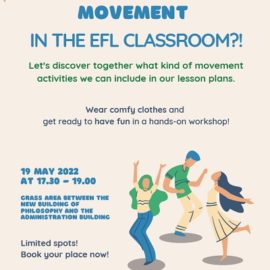
Date: 23/03/2021
Time: 18:00-19:30
This presentation probes into the merged area between language pedagogy and CLIL, and centers on weaving multi-genres board games (both physical and digital ones) in language teaching and learning. Grounded in the communicative approach to foreign language pedagogy, we trace the development of modern board games that are language (in)dependent and link them to the teaching of all four language skills (e.g., reading, writing, speaking and listening; plus vocabulary and grammar) within a constructivist learning framework. Specifically, board games create a constructivist classroom environment, where students and their learning are central; they also allow the growth of creativity, independence and higher order thinking, and reinforce learning through many of Gardner’s multiple intelligences. Additionally, the cooperative games stimulate interactivity and allow the students to work as a team and to work collaboratively towards a common goal; on the other hand, competitive games provide several stimuli to acquire not only linguistic knowledge.
Up to now, previous computer gaming suggestions for educational purposes were game specified, and thus could not be generalized; moreover, board game suggestions were usually focused on non-language teaching proposals. All-genres of modern board games are language independent (a game without text) or language dependent (a game with texts); both are ideal for language teaching and in concert with the tenets of the communicative approach to foreign language pedagogy. In this proposal, we will present specific board game selection criteria for presenting or eliciting language and a template of integrating every gaming genre (simulation, worker placement, deckbuilding, dice games, area control, puzzle games, knowledge games, combat games). We will present a model wherein any board game can be used in the current foreign language classroom by tying them to the teaching of specific language skills. We propose that every genre can be used to teach a specific language skill, grammar or vocabulary (e.g., speaking via board game streaming presentation or writing with reviewing or commenting in a forum) in (CLIL and) TEYL context. We will also provide several and extensive examples and will elaborate a concrete theoretical (board) gaming approach for language teaching and learning.
Instructor: Dr Athanasios Karasimos (akarasimos@gmail.com)
Athanasios Karasimos has graduated from the Department of Philology, University of Patras. He has 2 European Masters in Speech and Language Processing (one of them at the University of Edinburgh); his doctoral dissertation is in the field of Computational Morphology (Department of Philology, University of Patras). He was a member of the Laboratory of Modern Greek Dialects and participated in several research projects on Modern Greek dialects, corpora, aphasic speech and training of English language teachers. He was a fellow postdoctoral researcher at IKY. He has taught since 2012 at HOU, AUTH and EKPA various modules such as Educational Technology in English teaching, Research Methodology, Computational Linguistics, Corpus Linguistics and Teaching Vocabulary. He is a researcher in the national infrastructure for Digital Humanities DARIAH-GR / DYAS (Digital Humanities) as a member of the Academy of Athens team since 2014. His research interests focus on computational linguistics and machine learning, the use of corpora, educational technology and using video& board games in classrooms.
Students interested in attending the webinar should register here.




